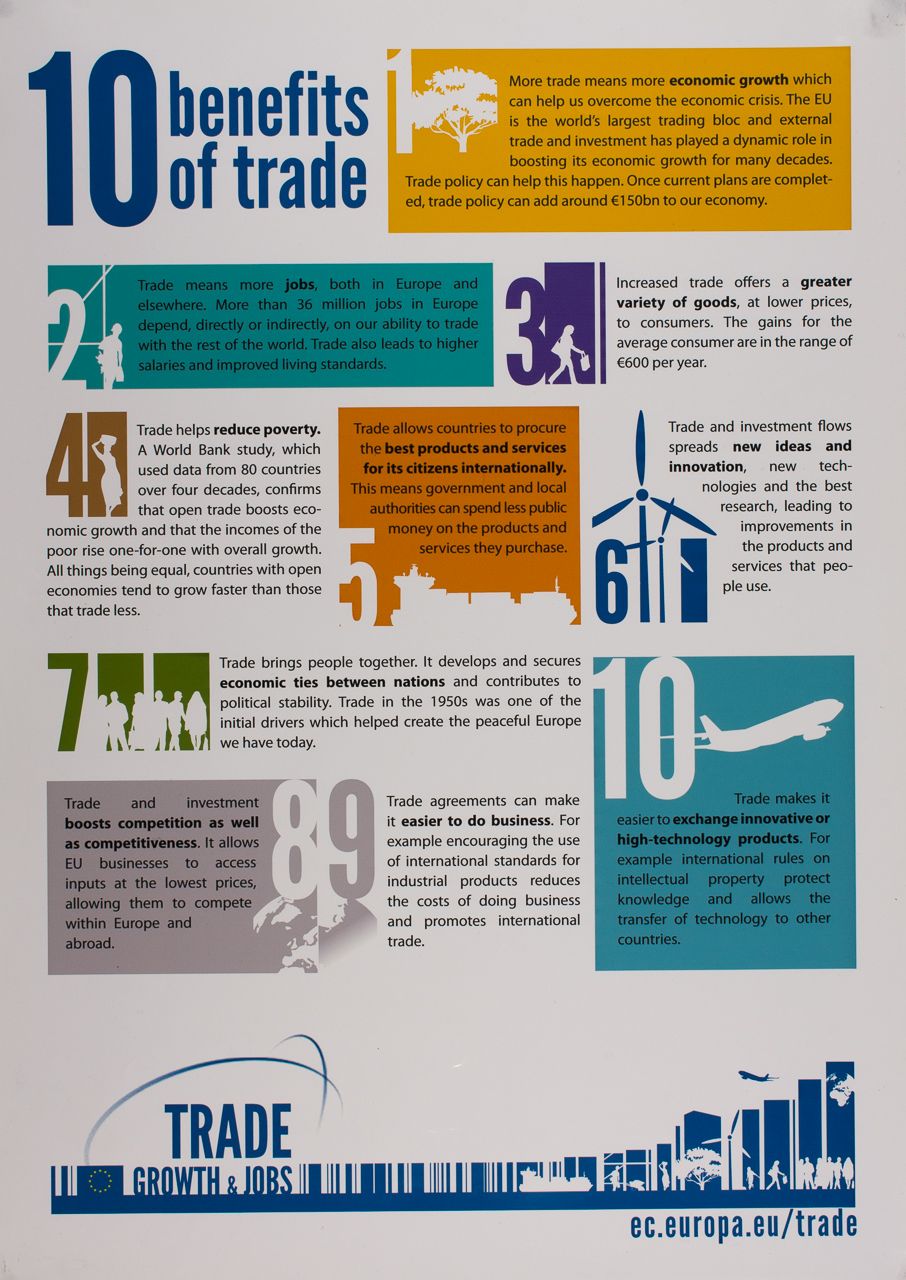Dr Maria Garcia assesses changes in the European Union’s trade policy and in the way the policy is communicated across member states.
Since the UK referendum on EU membership in June 2016, trade agreements, the future relationship with the EU and possible trade agreements with the US and other nations, have filled the headlines. Trade policy may have become very salient, but it was not always like that. This poster accompanied the launch of former EU Trade Commissioner, Karel De Gucht’s flagship trade policy, ‘Trade, Growth and Jobs’, and presents an optimistic vision of trade, highlighting how trade leads to more business, economic growth, jobs, poverty reduction, greater variety of products, and innovation.
Since the early days of European integration in the 1950s, the European Commission has been delegated the power to determine trade policy and to engage in international trade negotiations on behalf of all the member states. Its ethos has been one of extending liberalisation, imbued in the belief that facilitating trade generates economic benefits. Proponents of free trade have always espoused the view that through specialisation and trade overall production increases, creating benefits. The problem arises from the distribution of those benefits. Whilst trade has created benefits for consumers through lower prices, it can also lead to the loss of uncompetitive industries and to job losses in specific sectors. Benefits are diffuse, but the costs are localised and visible, leading to contestation of trade liberalisation.
It is within this context of contestation that the EU resorts to active positive messaging around trade, as exemplified in this poster. The poster avoids the tricky matter of potential losers from trade agreements or increased competition from abroad, but rather portrays the benefits of trade agreements as creating new business opportunities, finds strong echoes in the UK’s ‘Global Britain’ strategy for dealing with the fallout of Brexit. Like in the case of the EU’s messaging, potential losers are not mentioned.
Since the poster was created the EU’s trade policy has undergone important changes. When the EU started negotiations for a Transatlantic Trade and Investment Partnership (TTIP) with the US, unprecedented levels of politicisation and contestation for a trade agreement ensued. Campaigns led by environmental NGOs, consumer groups and civil society organisations raised concerns about the potential erosion of EU food standards (if the EU opened its market to US GMO food, for instance), potential for US multinational companies to sue European governments, and the secrecy surrounding negotiations.
Although TTIP negotiations were suspended at the start of 2017, public activism forced the EU to react. De Gucht’s successor as EU Trade Commissioner, Cecilia Malmström, redesigned the way the EU conducts its trade policy, by placing a new emphasis on transparency. Negotiation documents are now made public, a trade advisory group consisting of trade union, civil society and business representatives has been set up to support the Commission on trade agreements, amongst other initiatives. She also rebranded the EU’s trade policy as ‘Trade for All’. Whilst this continued the positive messaging from De Gucht’s time, it took more account of public concerns around trade liberalisation, and included commitments to raising labour and environmental standards through trade agreements and placing European values (democracy, rule of law, sustainable development, equality) at the heart of trade policy.
In this spirit improvements are underway to enhance the monitoring of labour and environmental standards in trade agreement partners, and new trade agreements are including specific gender clauses. It remains to be seen what effects these will have in practice, what is clear, however, is that trade policy and debates around trade, within the EU, have become more complex, public and nuanced than in the oversimplification presented in the poster.
